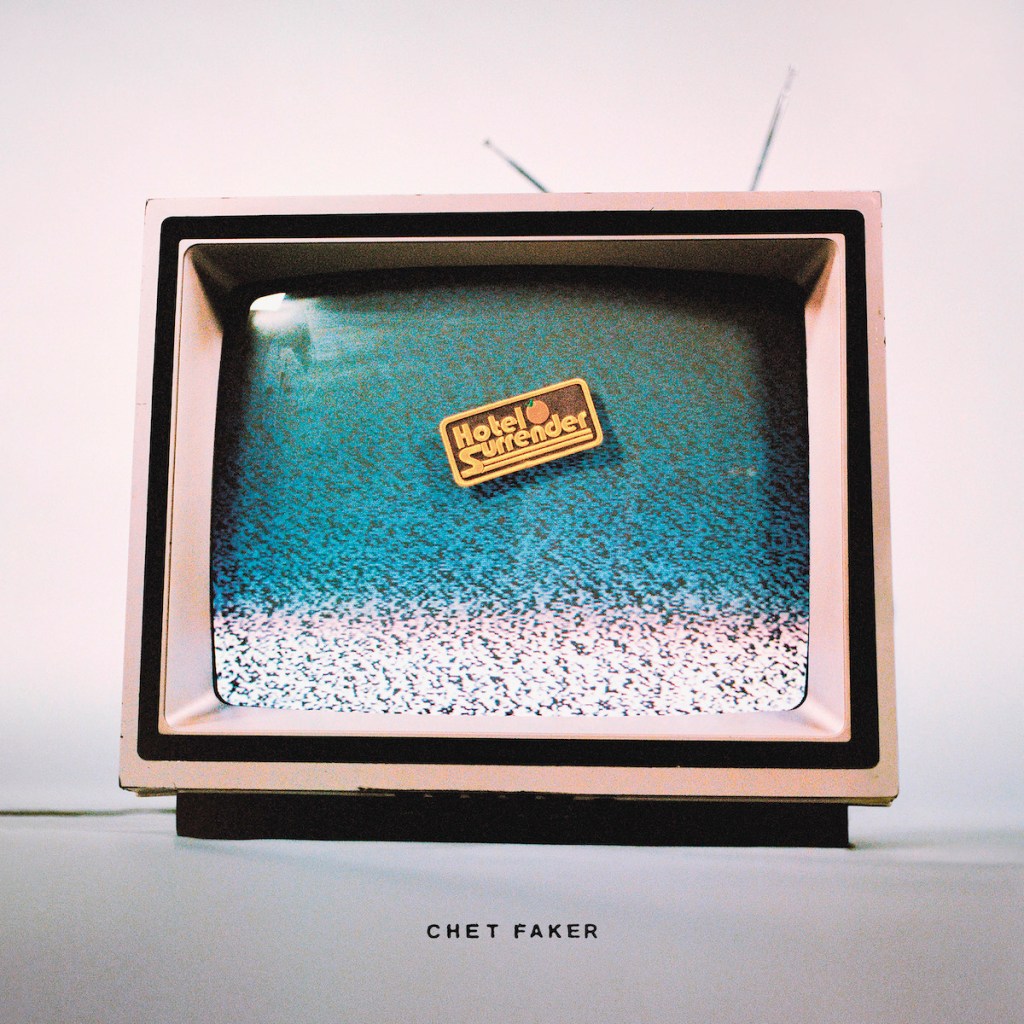Who had a Chet Faker comeback on their bingo card for 2021? Apparently not even Nicholas Murphy, the guy behind the electro-soul project. The beardy Melbourne singer, producer and instrumentalist spontaneously decided to revive his alter ego after recording songs that happened to have an intangible Chet Faker quality – funky basslines, emotive vocals and “feel-good” vibes. And now we have Hotel Surrender, a proper follow-up to 2014’s Built On Glass. Ironically, it’s an album that embraces the future rather than dwelling on the past.
Murphy launched Chet Faker in the early 2010s, his novel handle referencing the late jazz trumpeter Chet Baker. He established himself in Australia as a one-man band. In 2012, as Frank Ocean and The Weeknd inadvertently mobilised a new R&B movement, Murphy dropped the EP Thinking In Textures. Its chilled cover of BLACKstreet’s ’90s jam ‘No Diggity’ went viral and would eventually be licensed for a Beck’s Sapphire beer commercial airing during the Super Bowl – astronomical exposure. (BLACKstreet’s Chauncey “Black” Hannibal deemed Murphy’s rendition “wonderful”).
The bedroom auteur – then aligned with Future Classic – rolled out his debut Built On Glass, led by ‘Talk Is Cheap’ and boasting an international feature from New York art-rapper Kilo Kish on ‘Melt’. Built On Glass shot to #1 on the ARIA Top 50 Albums chart. Murphy scooped multiple ARIAs, including ‘Best Male Artist’. Plus he won 2014’s triple j Hottest 100 with ‘Talk Is Cheap’. ‘Gold’ and ‘1998’ were also in the top 10. Meanwhile, Murphy relocated to the US, even playing Coachella.
In 2016, the hipster fave did something seemingly inexplicable. He shed ‘Chet Faker’ for his birth name. Murphy declared it “an evolution”. But he appeared ambivalent about his persona. Alas, The Artist Formerly Known As Chet Faker’s next album, 2019’s Run Fast Sleep Naked, didn’t scale the commercial heights of Built On Glass, despite being musically expansive, experimental and ruminative (Murphy co-produced it alongside Nicolas Jaar’s Darkside cohort Dave Harrington). A soundscape LP, Music For Silence, was likewise overlooked.
Were fans really so superficial as to only care for Murphy as Chet Faker, in the same way they supposedly only dug Katy Perry with black hair pre-Witness? Or was it simply that Murphy – like the fame-shy Gotye – had either failed to capitalise on his initial momentum or, in leaving Australia, disconnected himself from his core audience?
Regardless, last October Murphy announced the return of Chet Faker, having signed a new deal with BMG Australia & New Zealand. He issued ‘Low’ as the honest – and bass-driven – first single off Hotel Surrender. In the lyrics, Murphy alludes to depression, singing, “Just because I feel low right now/It doesn’t mean all that I’ve got has run out.” But ‘Low’ is as much a meta-statement about his career and gaining perspective. The song catapulted him back in the Hottest 100. Perhaps ‘Chet Faker’ is Murphy’s lucky charm.
Now resident in NY, Murphy had largely completed Hotel Surrender pre-COVID-19. However, in many respects, it’s a pandemic album – Murphy’s theme carpe diem (‘seize the day’) or YOLO. In a presser, Murphy explains that he wrote the music “from a place of joy.” In fact, the material reveals a sense of loss, latent anxiety and melancholy. Yet, for Murphy, this expression represents a process of resolution. He’s determined to keep moving, not to mooch.
Murphy clearly intuits a cultural shift. In recent years, amid growing awareness of mental health, pop artists have increasingly explored interiority and existentialism. Murphy – who compares the musician’s role to that of a traditional healer – resists the inclination to retreat and instead reaches towards connection, openness and release. The festive ‘Get High’, unfolding with jazz piano, has him crooning, “I wanna get high, I wanna take a break from myself.”
The UK’s Jamie Lidell created a template for a modish white boy electro-soul in the 2000s (mind, that could also be attributed to Japan’s David Sylvian), presaging James Blake’s post-dubstep manoeuvres. Murphy was identified with the trend because of his BLACKstreet remake. Still, he distinguished himself from other Australians entering the avant’n’B realm, among them Silverchair frontman Daniel Johns, due to his proximity to dance music. Early, Murphy collaborated with Flume. The grooves permeating Built On Glass were often closer to Cut Copy’s indie-dance than alt-soul.
Hotel Surrender similarly vacillates between R&B and roller-disco bangers – though, in the case of the latter, there’s nothing as techno as ‘1998’ or, for that matter, Murphy’s epic collab with Bonobo, ‘No Reason’. Curiously, this time Murphy doesn’t bring in guests.
The Hotel Surrender prologue ‘Oh Me Oh My’ is a rhythmic throwback to ‘Gold’, still the best Chet Faker song. Murphy offers sage spoken word – the kind of wisdom that might be shared by a Byron Bay hitchhiker – and alternately flexes his falsetto and grunt-sings over a languidly funky and wonky electronic groove.
Occasionally, Murphy’s Chet Faker output can be too smooth, broaching the avant’n’B equivalent of yacht rock. Indeed, his strongest tracks have a dramatic, and sonic, tension as well as elaborate arrangements and textures – the importance of which Blake has long understood. Here, ‘Whatever Tomorrow’ stands out. Murphy pairs otherworldly synths and Blakeian hymnal organ chords, rueing his impatience for progression in a time of disquietude. (Surprisingly, Murphy hasn’t added the robotic acid remix by Belgian duo Soulwax as a sneaky bonus.) Again compelling, ‘Peace Of Mind’ is a subliminal and minimalist ballad worthy of Bilal’s Plug Research phase. The unusual ‘I Must Be Stupid’, with prominent blues guitar, is delicately self-recriminatory, Murphy stretching world-weary vocals.
Hotel Surrender‘s most blithe, liberatory and sensual moment is ‘Feel Good’ – which, with its filter disco elements, recalls Sam Sparro. Murphy anticipates flirting, flings and fun as the sun goes down.
Inevitably, some will be cynical about Chet Faker’s renaissance. But Hotel Surrender is convincing as a nostalgic reintroduction, and an affirmation, less than a rebrand. Who knows, Murphy’s electro-soul bops may just carry us through lockdown szn in the kitchen disco.
–












